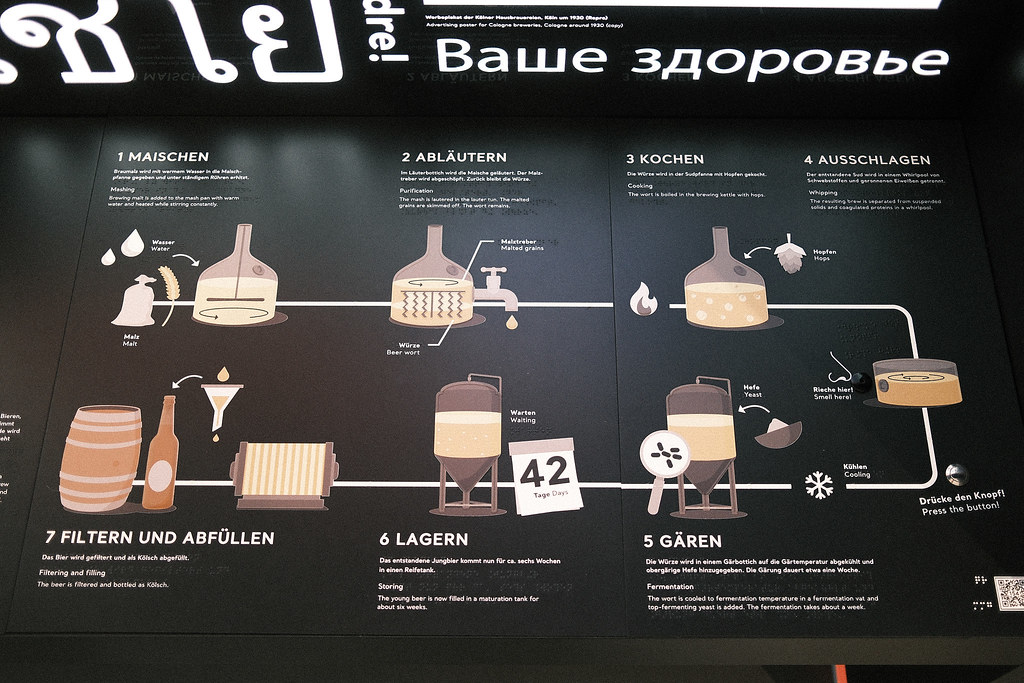Kölsch – Rethinking a local myth
In Cologne, one tradition distinctly captures the essence of the city more than any other: Kölsch. This clear, top-fermented beer is celebrated not just as a local specialty but as a vital part of the city’s heritage and a symbol of communal spirit. Its role in social gatherings and public life marks it as a cornerstone of Cologne’s cultural fabric. Yet, amidst its widespread acclaim, it’s crucial to remember that Kölsch is an alcoholic beverage. This fact prompts a necessary reevaluation of its place within Cologne’s culture and invites us to ponder the real foundations of a social community. It’s time to consider the implications of glorifying an alcoholic tradition and to explore what truly makes a community thrive.
 The Sünner brewery “Sünner im Walfisch”, historical brewery in the old town of Cologne.
The Sünner brewery “Sünner im Walfisch”, historical brewery in the old town of Cologne.
Origins
The origins of Kölsch date back to the early days of brewing in Cologne in the late-19th/early-20th century, with its modern iteration first brewed in 1906 by the Sünner brewery. The history of brewing in Cologne goes back much further, with the city’s first recorded brewery dating back to the middle ages. However, it was the Sünner brewery that brewed the first modern Kölsch, and it was the same brewery that first used the term “Kölsch” in 1918 to market its pale, top-fermented beer. Despite a decline in production during World War II, the post-war era saw a resurgence in Kölsch’s popularity, leading to its revival among local breweries. Today, Kölsch enjoys protection as a designation of origin under EU law, a status that ensures only beers crafted in and around Cologne can bear the name.
 Advertising poster for Dom Pilsner, Cologne around 1955 (copy). Seen a the City Museum of Cologne.
Advertising poster for Dom Pilsner, Cologne around 1955 (copy). Seen a the City Museum of Cologne.
 Schematic showing the brewing process of Kölsch beer. Seen a the City Museum of Cologne.
Schematic showing the brewing process of Kölsch beer. Seen a the City Museum of Cologne.
Kölsch and the Cologne culture
Nowadays, Kölsch is seen as a cultural icon that signifies belonging and togetherness. The tradition of enjoying Kölsch in the city’s numerous brewpubs (Brauhäuser) and bars seems to be a fundamental aspect of local social life. Indeed, it is true that these establishments are not merely places to drink; they are communal spaces where people from all walks of life gather to share stories, celebrate, and enjoy the company of friends and strangers alike. However, I think, not the alcohol should be glorified here, but the social aspect of it. It is camaraderie and hospitality that defines the Cologne culture, and the not the alcohol itself. One should also bear in mind that the Kölsch beer culture is just 100 years old compared to the overall 2000 years of development of the Cologne culture. This perspective invites us to question and broaden our understanding of cultural traditions and the role alcohol plays within them.
 An advertisement of the Früh brewery. It’s saying “Achtung Braustelle”, which means “Attention, brewery site” and which is a play on words with “Baustelle” (construction site) and “Brauerei” (brewery).
An advertisement of the Früh brewery. It’s saying “Achtung Braustelle”, which means “Attention, brewery site” and which is a play on words with “Baustelle” (construction site) and “Brauerei” (brewery).
The consumption of alcohol, including Kölsch, carries inherent risks and responsibilities. Immediate and long-term health consequences, alongside the potential for addiction and adverse impacts on personal and social life, underscore the need for mindfulness regarding alcohol’s addictive nature and the dangers of overconsumption. Those who choose to partake should do so with moderation and a keen awareness of their health and safety.
In today’s diverse beverage landscape, a multitude of alternatives to traditional alcoholic drinks exists, offering the taste and social experience of beer without the associated risks. These non-alcoholic options are not only healthier but also inclusive, allowing everyone to partake in social rituals without compromising their well-being or principles.
Emphasizing these alternatives reinforces a crucial message: one’s participation in community life and enjoyment of social gatherings does not necessitate the consumption of alcohol. The true essence of Cologne’s social culture lies in the bonds formed and the memories shared within these communal spaces. As we navigate our way through evolving social norms and health-conscious choices, it becomes increasingly clear that the heart of Cologne’s cultural identity can thrive, even in the absence of alcohol, rooted in the timeless values of togetherness and hospitality.
To clarify, I am not advocating for the abolition of Kölsch or any other alcoholic beverage. Instead, I am encouraging a reevaluation of the role alcohol plays in our lives and the importance of making informed choices that prioritize our well-being and the well-being of those around us. By fostering a culture of responsible drinking and promoting healthier alternatives, we can ensure that the spirit of community and camaraderie that defines Cologne’s culture remains vibrant and inclusive for all.
Conclusion
Over the last 100 years, Kölsch has become an integral part of Cologne’s cultural identity, and it is celebrated as a symbol of community and togetherness. Yet, it’s crucial to remember that the essence of social life in Cologne — or anywhere, for that matter — transcends the mere act of alcohol consumption. This reflection serves not as a call for the abolition of Kölsch or any alcoholic beverage but as an invitation to embrace a more mindful and inclusive approach to our drinking culture.
For those who want to enjoy the city’s communal spirit but prefer not to consume alcohol at all, there are plenty of alternatives available nowadays. The advent of non-alcoholic Kölsch variants and other beverages marks a significant step towards more inclusive social gatherings, ensuring that everyone can partake in the communal joys of Cologne, irrespective of their choice to consume alcohol. Such options enrich our traditions, offering new ways to participate in the city’s vibrant social life without compromising health or principles.
This dialogue about Kölsch, responsible drinking, and the availability of non-alcoholic alternatives is not isolated. It encourages us to reconsider other cultural practices, examining their roles and impacts on our community’s health and cohesion. By fostering a culture of informed choice and responsible consumption, we not only safeguard our well-being but also reinforce the bonds that define Cologne’s identity.
I have no doubts, that Cologne’s communal culture continues to flourish. Bolstered by an increasing awareness of inclusivity and health, we ensure that our cherished traditions remain vibrant and meaningful, nurturing a sense of belonging and togetherness that welcomes all. After all, this is the true essence of Cologne’s cultural spirit – a legacy of community and camaraderie that endures, evolving gracefully with the times.


comments